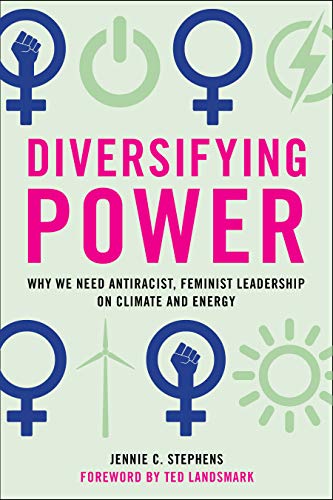We recently checked in with Prof. Jennie Stephens to discuss her new book, titled "Diversifying Power: Why We Need Antiracist, Feminist Leadership on Climate and Energy." She outlines how her research and interests have led to this new work and offers several examples of inspirational leaders who are already advocating change.
-
Chartist: Growing the Squad to Fight Climate Change
February 26, 2021
-
Independent Media Institute: White Patriarchy Won’t Solve the Climate Crisis: Antiracist, Feminist Leadership Is What We Need Right Now
February 11, 2021
-
Dame Magazine: Advancing Racial Justice Means Ending Fossil Fuel Reliance
December 14, 2020
-
The Humanist: A Better Future through Climate Justice
December 11, 2020
-
Blog for the Union of Concerned Scientists
December 9, 2020
-
All Aces on Air!: Diversifying Power x Advancing Racial Equity
December 2, 2020
-
Interview on The Point WCAI: Climate Change and Racial Justice
November 11, 2020
-
Interview on IdeaSphere KCBX: Diversifying Power
November 10, 2020
-
Interview on The Amy Beth Arkawy Show: Election Energy
October 23, 2020
-
Interview on “Conversations LIVE!” with Cyrus Webb
October 19, 2020
-
News@Northeastern: Climate change has made history this election cycle. But how will it fare in November?
October 14, 2020
-
The Bill Newman Show on WHMP
October 12, 2020
-
Why We Need Antiracist, Feminist Leadership On Climate And Energy on WAMC
October 5, 2020
-
Public Eye on WICN
October 4, 2020
-
Peace and Social Justice on KZFR
October 2, 2020
-
ASU Sustainability Series: Diversifying Power
October 1, 2020
-
Excerpt on Resisting the Polluter Elite by Jennie C. Stephens author of Diversifying Power on Resilience.org
September 24, 2020
-
Energy Nerd Show & Tell. Why Wealth Inequality Matters for Climate Change
September 24, 2020
-
Keeping Democracy Alive with Burt Cohen: Anti-Racist Feminism Key to COVID, Environmental Solutions
September 23, 2020
-
Earthworms from KDHX St. Louis Independent Media talks with Jennie C. Stephens about DIVERSIFYING POWER
September 22, 2020
Myra Kraft Open Classroom: 10/21/2020 | Climate & Energy Justice
SPPUA Q&A
Describe how your career and research has led to Diversifying Power.
This book is about a new and different kind of diverse and inclusive leadership that I believe is necessary to respond effectively to the climate crisis and accelerate a just renewable transition away from fossil fuels. As a white woman in a field dominated by white men, I have learned over the past two decades that the lack of diversity of people involved in climate and energy policy has led to a lack of diversity of ideas. Too often the climate crisis has been framed as an isolated scientific problem that requires a technological fix. This narrow technocratic lens, which I call climate isolationism, has proven to be ineffective in large part because it fails to connect climate and energy policy with what most communities are worried about, including jobs and economic justice, health and food, housing and transportation. Social justice, racial justice and institutional innovation have been largely ignored, and the challenge seems distant to most people. My research on energy democracy shows an alternative way to think about the social justice opportunities linked to how we respond to the climate crisis. From an energy democracy lens, the shift from a centralized polluting fossil fuel energy system to a distributed renewable-based future with more local community control and ownership is an opportunity to redistribute power literally and figuratively.
Describe how your career and research has led to Diversifying Power.
This book is about a new and different kind of diverse and inclusive leadership that I believe is necessary to respond effectively to the climate crisis and accelerate a just renewable transition away from fossil fuels. As a white woman in a field dominated by white men, I have learned over the past two decades that the lack of diversity of people involved in climate and energy policy has led to a lack of diversity of ideas. Too often the climate crisis has been framed as an isolated scientific problem that requires a technological fix. This narrow technocratic lens, which I call climate isolationism, has proven to be ineffective in large part because it fails to connect climate and energy policy with what most communities are worried about, including jobs and economic justice, health and food, housing and transportation. Social justice, racial justice and institutional innovation have been largely ignored, and the challenge seems distant to most people. My research on energy democracy shows an alternative way to think about the social justice opportunities linked to how we respond to the climate crisis. From an energy democracy lens, the shift from a centralized polluting fossil fuel energy system to a distributed renewable-based future with more local community control and ownership is an opportunity to redistribute power literally and figuratively.
What does progress look like tangibly? Is there a pinnacle?
We are now seeing much more diverse leadership in climate and energy, including many more leaders committed to social justice, economic justice, and racial justice. These leaders bring diverse life experiences that allow them to recognize the need, and the opportunity, for deep transformative change to build a more equitable and prosperous future for all. Emerging leaders are increasingly recognizing that the biggest challenges facing society are linked and the best opportunities for change are when these challenges are addressed together.
How do we sustain progress?
There are so many ways for all of us to be involved and engage in creating a better future for all. In the last chapter of the book I include specific action steps that we can all take to harness our collective recovery from the pandemic to build a more sustainable and just future. These include talking about and unlearning racism and sexism, voting and helping others to vote, advocating for system change, prioritizing diversity, equity and inclusion in everything we do, leveraging data and information for change, acting to inspire new leaders, and leading to inspire new leaders.
We can also advocate for and support innovative policy proposals including the Green New Deal, which explicitly connects climate action and the renewable transformation with jobs, economic justice and racial justice.
You’ll touch more on this in your book, but who are some women, indigenous peoples and/or POC in this space that others can look up to and emulate?
The Squad, the four junior congresswomen who have had such a huge impact on American politics despite being the target of Trump’s racist misogyny, are featured prominently. Representative Ayanna Pressley (D-MA) and Boston City Councilor Michelle Wu are two of the most inspiring local leaders ushering in transformation toward a more just and sustainable future. In addition to elected leaders, activists and leaders of non-profit organizations, leaders who are lawyers, doctors, educators, and farmers are also celebrated in the book including Jacqui Patterson, who leads the NAACP’s Environmental and Climate Justice Program; Jasmine Banks, executive director of the non-profit organization Unkoch-Your-Campus; Maura Healy, the MA Attorney General who is known as the people lawyer and has taken on ExxonMobil; and the Tiny House Warriors, indigenous women in Canada who are protesting against the transnational pipeline. Actually, one of the most difficult parts of writing the book was deciding which innovative and creative leaders to include! There are so many!
What gives you hope for the future?
I am inspired by creative and innovative leaders in so many different communities and organizations around the country and around the world. When women and people of color show up in leadership spaces where they have historically been excluded, their lived experiences provide powerful different perspectives on social justice and they often shift priorities toward a more collective, less individualistic approach. I am also inspired by all the white men who are increasingly prioritizing antiracist and feminist principles in their leadership.
Diversifying Power: Why We Need Antiracist, Feminist Leadership on Climate and Energy was published on Sep. 17, 2020 and is available for purchase from Amazon. 




